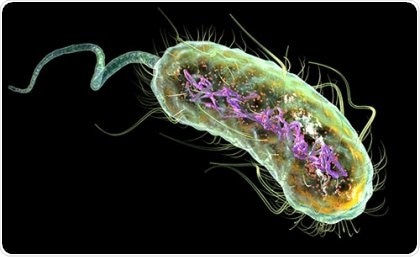Researchers have discovered a gene that makes E. coli bacteria resistant to antibiotics, effectively leading to better treatment for millions of people across the globe.

An artist’s impression of E. coli, which infects over 150 million people worldwide. Image Credit: The University of Queensland
According to the study led by The University of Queensland, a particular strain of the bacteria—E. coli ST131—had a previously undiscovered gene which rendered to its high resistance against usually prescribed antibiotics.
Mark Schembri, Professor at the School of Chemistry and Molecular Biosciences, University of Queensland, said this “resistance gene” is capable of spreading very quickly.
Unlike gene transfer in humans, where sex is required to transfer genes, bacteria have genetic structures in their cells—called plasmids—that are traded quickly and easily between each other. This resistance gene is in one such plasmid and is swiftly making E. coli ST131 extremely resistant to widely prescribed fluoroquinolone antibiotics.”
Mark Schembri, Professor, School of Chemistry and Molecular Biosciences, The University of Queensland
“These antibiotics are used to treat a wide range of infections, including urinary tract infections (UTIs), bloodstream infections and pneumonia. Importantly, this gene works with other resistance genes to achieve resistance at a level greater than the highest antibiotic concentrations that we can achieve during treatment,” he added.
Mark Schembri says, “So we’re going to have to rethink our treatment plan, and strive to create antibiotics that can tackle these infections in spite of this antibiotic resistance mechanism.”
Researchers have been able to explain for the first time how antibiotic-resistant E. coli ST131 has appeared and spread so rapidly around the world.
There are more than 150 million infections caused by E. coli every year, especially urinary tract infections (UTIs). Moreover, it is one of the most common causes of sepsis, which kills approximately 11 million people each year.
Scientists are now focussing to develop better treatments to halt the spread of E. coli ST131 infections.
We’ve lost a critical part of our armoury to treat UTI and sepsis, but there’s still hope. Now that we understand the impact of this plasmid-mediated antibiotic resistance gene, we can devise more tailored treatment strategies. These might include new combinations of antibiotics, or even alternative non-antibiotic drugs that block E. coli ST131 infection.”
Mark Schembri, Professor, School of Chemistry and Molecular Biosciences, The University of Queensland
Dr Minh-Duy Phan, lead author of the study, said that using this information could also be used to track emerging resistance against last-line antibiotics more efficiently.
Resistance against antibiotics like carbapenems and polymyxins is emerging rapidly in some parts of the world, and we found the fluoroquinolone resistance gene we characterized in our study is often linked to such resistance. Evolution has provided E. coli with this gene, but I’m confident that human ingenuity can still prevail against this deadly bacterium.”
Dr Minh-Duy Phan, Study Lead Author, The University of Queensland
Source:
Journal reference:
Phan, M.-D., et al. (2021) Plasmid-mediated ciprofloxacin resistance imparts a selective advantage on Escherichia coli ST131. Antimicrobial Agents and Chemotherapy. doi.org/10.1128/AAC.02146-21.